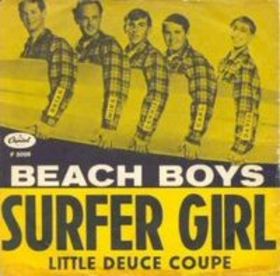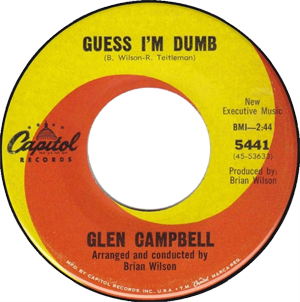
The Beach Boys are an American rock band formed in Hawthorne, California, in 1961. The group's original lineup consisted of brothers Brian, Dennis and Carl Wilson, their cousin Mike Love, and friend Al Jardine. Distinguished by its vocal harmonies, adolescent-oriented lyrics, and musical ingenuity, the band is one of the most influential acts of the rock era. The group drew on the music of older pop vocal groups, 1950s rock and roll, and black R&B to create its unique sound. Under Brian's direction, it often incorporated classical or jazz elements and unconventional recording techniques in innovative ways.

Brian Douglas Wilson is an American musician, singer, songwriter, and record producer who co-founded the Beach Boys. Often called a genius for his novel approaches to pop composition, extraordinary musical aptitude, and mastery of recording techniques, he is widely acknowledged as one of the most innovative and significant songwriters of the 20th century. His best-known work is distinguished for its high production values, complex harmonies and orchestrations, layered vocals, and introspective or ingenuous themes. Wilson is also known for his formerly high-ranged singing and lifelong struggles with mental illness.

Surfer Girl is the third studio album by the American rock band the Beach Boys, released September 16, 1963 on Capitol Records. It is largely a collection of surf songs. The LP reached number 7 in the U.S. and number 13 in the UK. Lead single "Surfer Girl", backed with "Little Deuce Coupe", was also a top 10 hit.

The Beach Boys Today! is the eighth studio album by the American rock band the Beach Boys, released March 8, 1965, by Capitol Records. It signaled a departure from their previous records with its orchestral sound, intimate subject matter, and abandonment of car or surf songs. Side one features an uptempo sound, while side two consists mostly of introspective ballads. Supported by this thematic approach, the record established the group as album artists rather than just a singles band.

Wild Honey is the thirteenth studio album by the American rock band the Beach Boys, released on December 18, 1967, by Capitol Records. It was the group's first foray into soul music and was heavily influenced by the R&B of Motown and Stax Records. The album was the band's worst-selling at that point, charting at number 24 in the US. Lead single "Wild Honey" peaked at number 31, while its follow-up "Darlin'" reached number 19. In the UK, the album peaked at number seven.

All Summer Long is the sixth album by the American rock band the Beach Boys, released July 13, 1964 on Capitol Records. Regarded as their first artistically unified collection of songs, as well as one of the first true concept albums, it marked the Beach Boys' first LP that was not focused on themes of cars or surfing. Instead, the songs are semi-autobiographical and relate to the experiences of a typical Southern Californian teenager, a theme encapsulated by the title track, "All Summer Long", and the often-imitated front cover, a modernist style photo collage depicting the band members fraternizing with young women on a beach.
"Little Deuce Coupe" is a song written by Brian Wilson and Roger Christian. The song first appeared as the B-side to The Beach Boys' 1963 single "Surfer Girl". The car referred to is the 1932 Ford Model 18. "Little Deuce Coupe" became The Beach Boys' highest charting B-side, peaking on September 28, 1963, at No. 15 on the Billboard Hot 100.

The Honeys were an American girl group, formed in Los Angeles in 1958, that initially comprised sisters Marilyn, Diane, and Barbara Rovell. Barbara was later replaced by their cousin, Ginger Blake. After 1962, the Rovell Sisters were rechristened "the Honeys" by the Beach Boys' Brian Wilson, who envisioned the group as a female counterpart to his band. Wilson served as the Honeys' record producer and chief songwriter, and later married Marilyn in late 1964.

Anthony D. Asher is an American songwriter and advertising copywriter who is best known for his collaborations with Brian Wilson and Roger Nichols in the 1960s. Asher co-wrote eight songs on the Beach Boys' 1966 album Pet Sounds, including the singles "God Only Knows", "Wouldn't It Be Nice", and "Caroline, No". According to Asher, he mainly served as a lyricist for Wilson's songs, but in some cases also contributed musical ideas. Asher also composed jingles, such as Mattel's slogan "You can tell it's Mattel—it's swell!", and contributed songs to The Partridge Family.
"You Still Believe in Me" is a song by American rock band the Beach Boys from their 1966 album Pet Sounds. Initially conceived as "In My Childhood", it was the first songwriting collaboration between Brian Wilson, the group's de facto leader, and songwriter Tony Asher. Wilson sang the lead vocal.
"Don't Talk (Put Your Head on My Shoulder)" is a song by American rock band the Beach Boys from their 1966 album Pet Sounds. Written by Brian Wilson and Tony Asher, it is a ballad about nonverbal communication between lovers. Musically, the song is distinguished for its chromaticism, the use of a string sextet, and its key ambiguity. It is among the most harmonically complex songs that Wilson ever composed.

"Caroline, No" is a song by American musician Brian Wilson that was released as his first solo record on March 7, 1966 and, two months later, reissued as the closing track on the Beach Boys' album Pet Sounds. Written with Tony Asher, the lyrics describe a disillusioned man who reflects on his former love interest and the loss of her innocence. Musically, it is distinguished for its jazz chords and unusual combination of instruments, including bass flutes, 12-string electric guitar, and muted harpsichord.

Marilyn Wilson-Rutherford is an American singer who is best known as the first wife of Beach Boys co-founder Brian Wilson. She was also a member of two girl groups, the Honeys in the 1960s and American Spring in the 1970s.

"Don't Worry Baby" is a song by American rock band the Beach Boys from their March 1964 album Shut Down Volume 2. Written by Brian Wilson and Roger Christian, Wilson's lead vocal on the track is considered one of his defining performances, and he later referred to "Don't Worry Baby" as perhaps the Beach Boys' finest record. It was issued in May 1964 as the B-side of "I Get Around", and charted separately at number 24.

"Surfer Girl" is a song by American rock band the Beach Boys from their 1963 album Surfer Girl. Written and sung by Brian Wilson, it was released as a single, backed with "Little Deuce Coupe", on July 22, 1963. The single was the first Beach Boys record to have Brian Wilson officially credited as the producer.
"Girls on the Beach" is a song by the American rock band the Beach Boys from their 1964 album All Summer Long. Written by Brian Wilson and Mike Love, the song is in the vein of the band's previous surf ballads and features Four Freshmen-inspired harmonies. The song also served as the title track to the movie The Girls on the Beach.

"I Do" is a song written by Brian Wilson and Roger Christian, originally released as a single by American vocal group the Castells in March 1964. The recording was also produced and arranged by Wilson. The song's lyrics illustrate a young man getting ready for marriage. Its melody was derived from "County Fair", a song Wilson had earlier written for the Beach Boys.

"Surf City" is a 1963 song recorded by American music duo Jan and Dean about a fictitious surf spot where there are "two girls for every boy". Written by Brian Wilson, Jan Berry and Dean Torrence, it was the first surf song to become a national number-one hit.
"Their Hearts Were Full of Spring" is a song written by Bobby Troup. It has been recorded by many artists including Jimmie Rodgers, the Four Freshmen, the Lettermen, the Beach Boys, Sue Raney, the Cyrkle, and Tatsuro Yamashita.

"Guess I'm Dumb" is a song recorded by American singer Glen Campbell that was released as his seventh single on Capitol Records on June 7, 1965. Written by Brian Wilson and Russ Titelman, it is a love song that describes a man who regrets ending a relationship after he realizes he still harbors deep feelings for his former lover. The single failed to chart.















